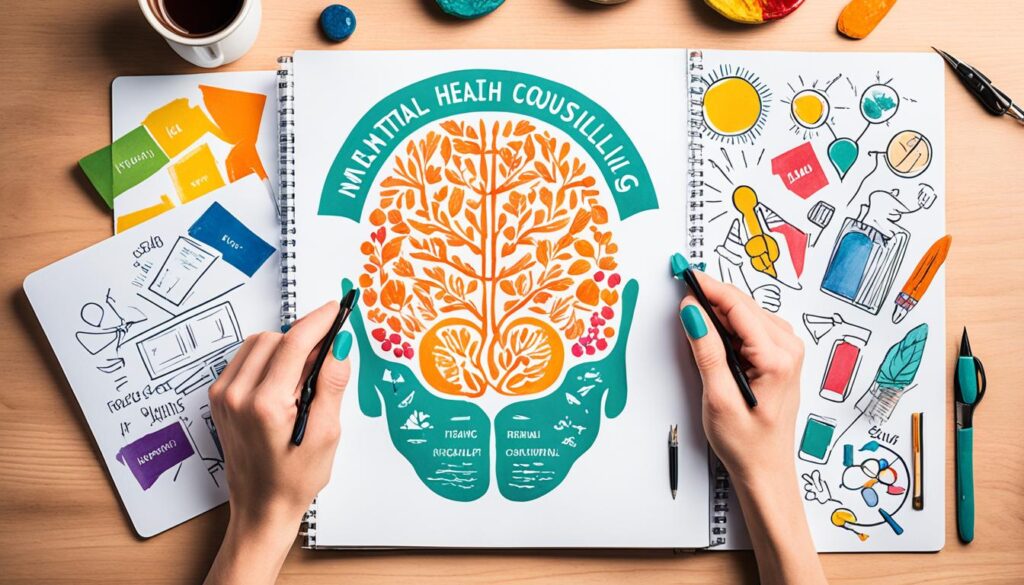Mental health counseling is crucial for anyone wanting to boost their well-being and deal with emotional or behavioral issues. Trained mental health counselors focus on helping people cope with mental health challenges such as depression, anxiety, trauma, and addiction. They offer a private space to explore thoughts and feelings. Through this, clients learn to deal with stress better, improve relationships, and enjoy life more.
The positive effects of mental health counseling are vast. Sessions might be one-on-one, with a group, or family, using methods like CBT and DBT. This helps people handle tough situations, process trauma, and become stronger and more aware. Whether facing a mental health obstacle or just wanting to feel better, counseling supports growth and change.
Key Takeaways
- Mental health counselors provide a confidential and safe space for individuals to explore their thoughts, emotions, and behaviors.
- Counseling can help clients understand and manage stress, anxiety, and other mental health challenges, preventing long-term health complications.
- Counseling sessions can improve communication and interpersonal skills, increase self-acceptance and self-esteem, and facilitate positive behavioral changes.
- Reasons to seek mental health counseling include difficulty concentrating, relationship problems, grief and loss, stress management issues, and symptoms of depression or anxiety.
- Mental health counselors utilize a variety of therapeutic approaches, including individual therapy, group therapy, CBT, and family therapy, to meet the unique needs of each client.
Understanding Thoughts and Emotions Through Mental Health Counseling
Mental health counseling offers a confidential and safe space. Here, people can look into their deep thoughts and feelings. Licensed mental health professionals help create an open environment. In this space, clients can freely talk about their mental health challenges and emotional well-being. They don’t have to worry about being judged.
Confidential and Safe Space for Self-Exploration
In a confidential and safe environment, clients can dive into self-exploration. This helps them understand why they feel or act a certain way. By talking freely, they learn more about themselves. This leads to personal growth and awareness.
Identify Unhealthy Patterns and Behaviors
Working with a mental health counselor helps people spot unhealthy patterns or behaviors. They can see how these are linked to their mental health disorder or emotional health. This understanding is crucial. It lets them start making changes for the better.
Develop Coping Mechanisms for Difficult Emotions
One main goal of mental health counseling is to teach clients how to handle difficult emotions. Counselors show them ways to cope. These tools are vital for facing life’s mental health challenges. They also help in keeping a good level of mental well-being.
Managing Stress and Anxiety with Counseling

Seeing a mental health counselor can really help people deal with stress and anxiety. These feelings can seriously affect our bodies and minds. If we don’t treat them, they can cause problems that last a long time.
Techniques to Reduce Stress and Cortisol Levels
Stress makes our bodies produce a hormone called cortisol. This hormone can make us feel tired, get headaches, and have tense muscles. Counselors show their clients how to do things like deep breathing and mindfulness. These techniques help lower cortisol and make people feel better overall.
Coping Strategies for Anxiety and Panic Attacks
For some, anxiety and panic attacks are really hard to live with. Mental health counselors can teach ways to calm down and change our thinking. They provide tools to handle panic attacks whenever they come.
Preventing Long-Term Health Complications
Ignoring stress and anxiety can be very bad for our health. These feelings weaken our body defenses and increase our chances of getting sick. Counselors can help us find out what causes our stress. They teach us how to deal with it, protecting our mental, emotional, and physical health for the long run.
Navigating Life Changes with Mental Health Counseling

Life is full of ups and downs, and mental health counseling can be a massive help. These professionals offer a fresh view. They help clients understand themselves, what matters to them, and make choices that boost their mental well-being.
Gaining Perspective on Challenging Transitions
Big changes like switching jobs or losing someone we love can be tough. Mental health counselors are there to help us through. They create a safe space where we can deal with our feelings. We learn to spot and change negative thoughts. And we figure out how to get through the hard times with coping strategies.
Aligning Decisions with Personal Values
When life throws us curveballs, mental health counseling aids in finding our true values. We dive deep into what really matters to us. With help, we align our choices with these important aspects of our lives. Such counseling helps us make decisions that feel right deep down.
Through emotional support and practical tips, mental health counselors guide us. They teach us to face life’s changes head-on. Their method helps us become stronger and more self-aware. This approach is key to staying well during tough times.
Improving Relationships Through Counseling

Working with mental health counselors can really help make personal relationships better. They offer a safe place to talk, never judging. They assist clients in seeing how their relationships work. Also, they help people spot bad patterns and learn how to communicate better, solving problems more effectively.
Understanding Relationship Dynamics
Through therapy, people learn a lot about their relationships, whether they’re love, family, or friends. Counselors help find the real issues, such as trust problems or old wounds. This helps clients be more understanding and caring in their relationships.
Enhancing Communication and Conflict Resolution Skills
Good communication is key to any good relationship. Counselors teach people ways to speak up, listen, and solve fights calmly. They might learn to listen well, use “I” instead of “you,” and reach win-win solutions with others.
Building Trust and Healthy Boundaries
Therapy can also help people trust and know where to draw the line in relationships. By talking through issues like past hurts and fears, clients can learn to express what they need. This empowers them to create stronger, healthier, and more balanced relationships.
Mental Health Counseling: A Safe and Confidential Space

Feeling safe when talking about your thoughts, feelings, and mental health challenges is crucial. Mental health counseling offers a confidential space where this is possible. There’s no need to worry about being judged. This environment lets you share openly, aiding in self-discovery and feeling empowered. Mental health counselors work hard to make these spaces feel safe. They aim for clients to feel relaxed, even when discussing very private things.
Therapists and counselors help people understand their mental and emotional health better. They point out unhealthy patterns and behaviors causing issues. Their goal is to help in a private way. This approach encourages talking about difficult experiences. It leads to personal growth and the learning of new ways to cope.
Therapists are there to help people work through mental health challenges. They provide a space that’s both safe and private. This teamwork allows for deep exploration. People often find the tools and plans needed for lasting emotional, psychological, and behavioral health.
Mental Health Counseling Benefits: An Overview

Mental health counseling brings many advantages to people’s lives. It can help individuals improve how they feel and how they interact with others. With the support of professional counselors, clients can learn important skills and get new insights.
Improved Communication and Interpersonal Skills
Counseling can make a big difference in how we communicate and connect with others. In therapy sessions, people discover how to share their thoughts and feelings better. They also learn to listen actively and understand viewpoints other than their own. This leads to better relationships with loved ones, friends, and colleagues.
Increased Self-Acceptance and Self-Esteem
Counseling also boosts self-acceptance and self-esteem. In a judgment-free zone, clients explore their thoughts and feelings. They gain a stronger sense of self and learn to value their unique traits and strengths. This newfound self-awareness and self-worth can boost their confidence and optimism.
Ability to Change Self-Defeating Behaviors
Identifying and transforming negative behaviors is another key gain of counseling. Working with a counselor, clients can spot harmful thoughts and actions. They can then work on new, healthier ways of coping and challenge old, negative thoughts. This helps them become mentally and emotionally healthier.
Reasons to Seek Mental Health Counseling

People decide to get mental health counseling for many reasons. They may have trouble focusing or finishing tasks. Family conflicts, loss, stress, trauma, and emotional problems like depression and anxiety are common, too.
Difficulty Concentrating or Completing Tasks
If you’re finding it hard to focus or get things done, a mental health counselor can help. They might show you new ways to improve how you focus and organize your life.
Family or Relationship Problems
Navigating personal relationships can be tough. Counselors work with you to better communicate and solve problems. They create a place where you can think about your relationships in a clear and healthy way.
Grief and Loss Issues
Losing someone you love or facing other major losses is very hard. Counseling can guide you through these times, helping you deal with the pain and learn how to cope.
Stress Management Challenges
Stress is a big problem in today’s world. Counselors can help you figure out what’s causing your stress and find ways to manage it better. They can also suggest ways to keep a good balance between work and life.
Coping with Traumatic Events
After a traumatic event, a safe space to talk can make a difference. Counseling offers a place to start healing, find ways to cope, and move forward from the trauma.
Depression, Anxiety, or Lack of Motivation
Depression, anxiety, or feeling unmotivated can really get in the way of living your life. Counselors use different methods to help you deal with these issues. With their help, you can start feeling better and do the things you want to do.
Getting help from a mental health counselor can change your life. You can overcome challenges, become more resilient, and find more happiness. It’s about taking a step towards a better, healthier you.
Mental Health Counseling Approaches

Mental health counselors use many ways to help people with their mental health. They choose from methods like talking one-on-one, talking in groups, and focusing on changing thoughts and behaviors (CBT). Each person may need a different method to fit their needs and goals.
Individual Therapy (Psychotherapy)
Individual therapy, or psychotherapy, is about a private talk between a counselor and a client. This method helps the counselor really understand the client. They work together to create new ways to cope with life’s challenges.
Group Therapy
Group therapy puts people with similar struggles together. A trained counselor guides the group. Members share experiences and support each other. This process can make people feel less alone and help them learn from peers.
Cognitive-Behavioral Therapy (CBT)
Cognitive-behavioral therapy (CBT) focuses on changing negative thoughts and actions. It helps by teaching people to challenge their own beliefs. This leads to better ways to handle life’s ups and downs.
Family Therapy
In family therapy, families work with the counselor to improve their relationships. The counselor helps with better communication and understanding. This can make families stronger and more supportive.
Dialectical Behavioral Therapy (DBT)
Dialectical behavioral therapy (DBT) blends CBT with mindfulness. It’s good for those with big emotions or who self-harm. DBT helps them manage emotions better and find healthier ways to cope.
Contingency Management Therapy (CM)
Contingency management therapy (CM) is used for addiction. It offers rewards for staying clean. This method motivates people to change for the better and keep on a healthy path.
Motivational Interviewing
Motivational interviewing is about a partnership for change. The counselor helps the client find their personal reasons for changing. This leads clients to make changes from within, towards their mental health and life goals.
Mental Health Counseling
Mental health counseling is a process that helps people overcome challenges and build resilience. It helps them develop skills to handle life better. This is done by working with professionals who guide them.
Promoting Recovery and Well-Being
Mental health counseling aims to improve overall health. Counselors use proven methods to address clients’ mental health issues and traumas. They help clients feel in control of their lives again, finding happiness and purpose.
Developing Coping Skills and Problem-Solving Abilities
Learning to cope with stress and solve problems is key in counseling. Counselors and clients work together to find ways to manage emotions and deal with conflicts. This helps people grow more self-aware, smarter about their feelings, and stronger to face any challenge.
Building Self-Confidence and Emotional Resilience
Counseling is also about building confidence and inner strength. It guides individuals to feel more self-assured and accept themselves. With their counselor’s help, they learn to act more confidently, connect with others better, and live more genuinely and successfully.
FAQs
Q: What is mental health counseling?
A: Mental health counseling is a form of therapy that helps individuals deal with various mental health issues, emotional challenges, and improve their overall well-being.
Q: How can a clinical mental health counselor help me?
A: A clinical mental health counselor can provide therapeutic support, offer coping strategies, and assist in managing mental health conditions such as anxiety, depression, PTSD, and more.
Q: What is the importance of finding a licensed mental health counselor?
A: It is crucial to find a licensed mental health counselor as they have completed the required education, training, and are equipped to provide ethical and competent counseling services.
Q: What can I expect from a mental health counseling program?
A: A mental health counseling program typically focuses on theory, practice, and ethics of counseling, as well as provides practical experiences through internships or clinical placements.
Q: How do I pursue a career in clinical mental health counseling?
A: To pursue a career in clinical mental health counseling, one usually needs to obtain a master’s degree in the field, complete supervised clinical hours, and obtain licensure to practice.
Q: What is the role of science in clinical mental health counseling?
A: Science in clinical mental health counseling involves utilizing evidence-based practices, research, and psychological knowledge to inform counseling interventions and strategies.
Q: What are the steps to becoming a licensed clinical mental health counselor?
A: The steps typically involve completing a master’s program in clinical mental health counseling, accruing supervised clinical hours, passing licensure exams, and meeting state requirements for licensure.
Source Links
- https://www.avila.edu/2022/12/13/5-benefits-of-working-with-a-mental-health-counselor/
- https://montarebehavioralhealth.com/blog/8-benefits-of-mental-health-counseling/
- https://mhanational.org/therapy




